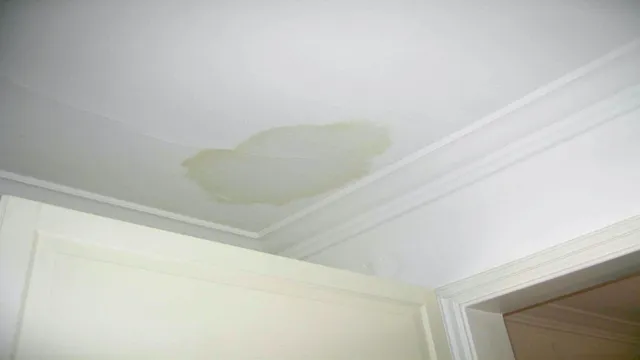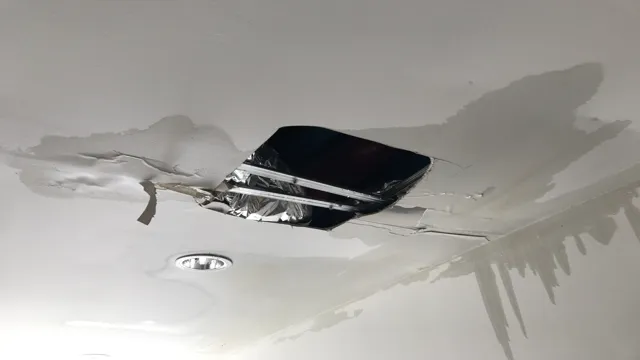Has your AC unit been causing a drip, drip, drip sound that’s becoming more persistent by the day? If you’ve noticed water stains or discolorations on your ceiling or even worse, actual water dripping through your AC grille, then it’s time to address the issue ASAP. As much as we rely on air conditioning devices to keep us cool during the summer months, they are sometimes prone to leakages, which can cause significant damage to your home’s interior and structural components. If you’re experiencing an AC unit leaking through the ceiling, don’t panic.
This blog post will provide you with all the information you need to get your unit back up and running in no time.
Assessing the Damage
If you’ve noticed your AC unit leaking through your ceiling, it is crucial to assess the damage as soon as possible. First, turn off the AC unit and ceiling fan to prevent further water damage. Inspect the affected area and look for signs of water stains, sagging ceiling, or any visible cracks.
If the damage is extensive, it’s best to contact a licensed professional for repair. A leaking AC unit can cause severe water damage to your home, including mold growth and structural issues. It’s important to address the issue in a timely manner to prevent further damage and ensure your family’s safety.
Remember to schedule regular maintenance for your AC unit to avoid future leaks and prolong its lifespan.
Determining the Severity of the Leak
Assuming you detect a leak, your first step should be evaluating the damage. How much water did the leak generate? A few drops, or a flood? What’s the source of the leak? These are all crucial questions to answer if you’re going to assess the severity of a leak. If the leak is minor and you catch it early on, you might be able to fix it yourself, saving you time and money.
However, for more serious leaks, it’s advisable to call in an expert. A fully licensed plumber will usually have the right equipment and expertise to pinpoint the source of the leak and provide an appropriate fix. Remember, swift and decisive action is critical.
Small leaks can quickly snowball into massive problems, and if you don’t take prompt action, you could be looking at major water damage and costly repairs. So take the time to assess the damage and respond to leaks with the urgency they warrant.

Identifying the Cause of the Leak
When it comes to a leak in your home, it’s essential to assess the damage as soon as possible. The first step in assessing the damage is to identify the cause of the leak. Knowing what caused the leak can help prevent future damage from occurring.
For example, if the leak was caused by a broken pipe, it’s crucial to turn off the water source and call a professional plumber. After identifying the cause, it’s important to check the extent of the damage. Not all leaks are immediately apparent, and they can cause significant damage to your home if left untreated.
Assessing the damage will help you determine what repairs or replacements are needed. It’s always better to address the issue sooner rather than later to prevent more extensive and costly damage. In the end, you’ll be glad you took quick action to assess and fix the problem.
Fixing the Problem
If you’re experiencing your AC unit leaking through the ceiling, the first step is to turn off the unit to prevent further damage to your home. Next, you’ll want to locate the source of the leak. It could be a clogged drain line or a damaged condensate pan, both of which can be fixed by a professional HVAC technician.
Another common cause of leaks is a frozen evaporator coil, which can be caused by a dirty air filter or low refrigerant levels. In some cases, you may need to replace the AC unit altogether if it’s outdated or beyond repair. To prevent future leaks, make sure to regularly clean and maintain your unit, and schedule annual check-ups and tune-ups with a professional.
Don’t wait until it’s too late and you have water damage to deal with – act fast to fix the problem before it gets worse.
Temporarily Patching the Leak
When it comes to dealing with leaks in your home, temporarily patching the problem is a good place to start. For minor leaks, such as a dripping faucet or a small hole in a pipe, there are a variety of solutions available. One quick fix is to use a leak sealing tape or putty.
These products are designed to stop leaks by creating a seal around the affected area, effectively stopping the water from flowing. Another option is to use a rubber patch, which can be placed over the leak and secured in place with a hose clamp. While these solutions may only offer a temporary fix, they can buy you some time while you look into more permanent solutions, which may involve replacing the damaged pipe or fixture.
Whatever solution you choose, it’s important to act quickly when you discover a leak in order to prevent water damage and ensure the safety of your home and family.
Calling a Professional HVAC Technician
If you’re experiencing issues with your HVAC system, calling a professional HVAC technician is the best solution. These technicians know how to fix any problem related to heating, ventilation, and air conditioning systems. They are trained in troubleshooting and can quickly identify the root cause of the problem.
Whether your system is making strange noises, not providing enough heat or cooling, or not turning on altogether, an HVAC technician can diagnose the problem and fix it efficiently. Attempting to fix the problem yourself may lead to further complications or make the issue worse. Hiring a professional HVAC technician may seem expensive, but it’s a worthwhile investment in the safety and function of your home’s heating and cooling system.
Don’t let small problems turn into big ones – call a professional HVAC technician today.
Replacing Damaged Components
When it comes to fixing a damaged appliance or device, one of the most common solutions is to replace any damaged components. This process involves identifying the faulty parts and finding suitable replacements to ensure proper functionality of the device. It’s important to replace damaged components as soon as possible to prevent any further damage or malfunctions that may occur.
Whether it’s something as small as a faulty capacitor or a larger component like a malfunctioning motor, replacing the broken parts can be a cost-effective and efficient solution to fixing the problem. Think of it as replacing a missing puzzle piece to complete the picture. So, if you’re experiencing any issues with your appliance or device, don’t hesitate to identify and replace any damaged components to get it up and running again.
Preventing Future Leaks
If you have experienced an AC unit leaking through the ceiling, the first thing you should do is turn off the unit to prevent any further damage. Once that is done, you should assess the situation and determine the root cause of the leak. Common causes include a clogged drain line, a damaged condensate pump, or a blocked air filter.
Regular maintenance and upkeep can help prevent future leaks by ensuring that all components are functioning properly. This includes cleaning or replacing air filters, unclogging drain lines, and checking the condensate pump for damage. Additionally, it’s important to regularly inspect your AC unit and ceiling for water stains or other signs of leaks, especially after heavy rainfall or significant changes in temperature.
By taking these preventative measures, you can avoid the stress and expense of dealing with an AC unit leak in the future.
Regular Maintenance and Inspections
Regular maintenance and inspections are crucial when it comes to preventing future leaks in your home. By properly maintaining your plumbing and regularly inspecting your pipes, you can catch potential issues before they become major problems. One way to prevent future leaks is by checking for any signs of water damage and addressing them promptly.
Additionally, it’s important to regularly clean out clogged drains and replace any worn-out or damaged pipes. Another helpful tip is to insulate your pipes, especially during colder months, to prevent freezing and potential cracking. By implementing these preventative measures and staying proactive with your plumbing maintenance, you can avoid costly leaks and repairs down the road.
So don’t wait until it’s too late, take action now to protect your home and prevent future plumbing issues.
Upgrading Your HVAC System
When upgrading your HVAC system, it’s crucial to take steps to prevent future leaks. Leaks can result in a loss of energy efficiency and increased utility bills. One of the best ways to prevent leaks is by ensuring that your ductwork is properly sealed.
Over time, the connections between ducts can begin to loosen, causing air to escape. Sealing these connections with mastic or foil tape can help prevent leaks and improve the overall performance of your HVAC system. It’s also important to have your system regularly inspected by a professional to identify any potential issues before they become major problems.
By taking these preventative measures, you can save money and improve the comfort of your home.
Conclusion
Well, it appears that your AC unit has been feeling a little leaky lately and has decided to share its waterworks with the ceiling. It’s not the most glamorous situation, but it’s a reminder that even the coolest of appliances have their faults. Perhaps it’s time to give your AC some TLC and have a professional take a look at it before it rains indoors.
Until then, grab an umbrella and be thankful for gravity, as it’s doing its best to keep the water from flooding your living room.”
FAQs
What are the common reasons for an AC unit leaking through the ceiling?
The common reasons for an AC unit leaking through the ceiling are clogged condensate drain line, broken or disconnected drain pan, frozen evaporator coil, or improper installation.
How do I know if my AC unit is leaking through the ceiling?
You can know if your AC unit is leaking through the ceiling by the formation of water stains or puddles on the ceiling, wet spots or dampness on the walls, or dripping sounds.
Can I fix the leaking through my AC unit myself?
Fixing the leaking through the AC unit yourself is not recommended, as it involves handling electrical components and refrigerant, which can be dangerous. It is best to call a professional HVAC technician to fix the issue.
What can happen if I ignore the AC unit leaking through the ceiling?
Ignoring the AC unit leaking through the ceiling can lead to further damage to your property, including mold growth, structural damage, and electrical hazards. Moreover, it can also result in reduced indoor air quality and increased energy bills.

